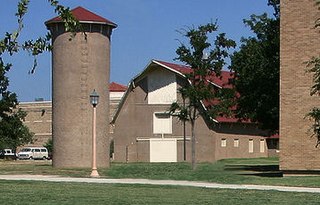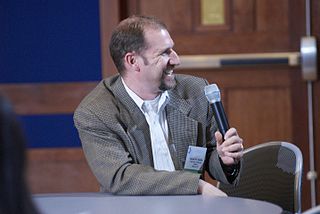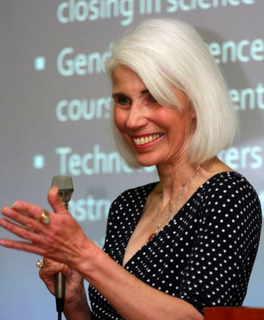Related Research Articles

Science education is the teaching and learning of science to non-scientists, such as school children, college students, or adults within the general public. The field of science education includes work in science content, science process, some social science, and some teaching pedagogy. The standards for science education provide expectations for the development of understanding for students through the entire course of their K-12 education and beyond. The traditional subjects included in the standards are physical, life, earth, space, and human sciences.
The Doctor of Education is both a research and professional doctoral degree that focuses on the field of education. As the highest degree in the field, it prepares the holder for academic, research, administrative, clinical, or professional positions in educational, civil, private organizations, or public institutions. While it may be referred to as a professional doctorate in some jurisdictions, it should not be confused with other professional doctorates such as MD or JD, as these degrees are commonly undergraduate in nature and function as first-professional degrees.
Sirindhorn International Institute of Technology (SIIT) is a semi-autonomous institute of technology established in 1992 within Thammasat University. It is located in Pathum Thani, Thailand. One of Thailand's research universities, it offers science, technology and engineering education, as well as related management programs. All are international programs, with English language as a medium of instruction. The institute is part of the Links to Asia by Organizing Traineeship and Student Exchange network, an international consortium of universities in Europe and Asia.
Mathematics, Engineering, Science Achievement (MESA) is an academic preparation program for pre-college, community college and university-level students. Established in 1970 in California, the program provides academic support to students from educationally disadvantaged backgrounds throughout the education pathway so they will excel in math and science and ultimately attain four-year degrees in science, technology, engineering or math (STEM) fields. The program has successfully been replicated in over a dozen other states.

Agricultural Education is the teaching of agriculture, natural resources, and land management. At higher levels, agricultural education is primarily undertaken to prepare students for employment in the agricultural sector. Classes taught in an agricultural education curriculum may include horticulture, land management, turf grass management, agricultural science, small animal care, machine and shop classes, health and nutrition, livestock management, and biology.
Science, Technology, Engineering and Mathematics (STEM), previously Science, Math, Engineering and Technology (SMET), is a term used to group together these academic disciplines. This term is typically used when addressing education policy and curriculum choices in schools to improve competitiveness in science and technology development. It has implications for workforce development, national security concerns and immigration policy. The science in STEM typically refers to two out of the three major branches of science: natural sciences, including biology, physics, and chemistry, and formal sciences, of which mathematics is an example, along with logic and statistics; the third major branch of science, social science such as:psychology, sociology, and political science, are categorized separately from the other two branches of science, and are instead grouped together with humanities and arts to form another counterpart acronym named HASS - Humanities, Arts, and Social Sciences. In the United States/ United Kingdom education system, in elementary, middle, and high schools, the term science refers primarily to the natural sciences, with mathematics being a standalone subject, and the social sciences are combined with the humanities under the umbrella term social studies.

The American Competitiveness Initiative (ACI) is a federal assistance program intended to help America maintain its competitiveness through investment in research and development (R&D) and education. The ACI’s focus is on programs that are likely to strengthen U.S. competitiveness by targeting funding to agencies that support research in the physical sciences. NASA, however, is not included in the ACI.

An engineering technician is primarily trained in the skills and techniques related to a specific branch of engineering, with a practical understanding of the relevant engineering concepts. Engineering technicians often assist engineers and technologists in projects relating to research and development, or focus on post-development activities like implementation or operation. An engineering technician is between a skilled craft worker and a technologist.
Connected Mathematics is a comprehensive mathematics program intended for U.S. students in grades 6-8. The curriculum design, text materials for students, and supporting resources for teachers were created and have been progressively refined by the Connected Mathematics Project (CMP) at Michigan State University with advice and contributions from many mathematics teachers, curriculum developers, mathematicians, and mathematics education researchers.
Arts integration is an approach to teaching that integrates the fine and performing arts as primary pathways to learning. Arts integration differs from traditional education by its inclusion of both the arts discipline and a traditional subject as part of learning The goal of arts integration is to increase knowledge of a general subject area while concurrently fostering a greater understanding and appreciation of the fine and performing arts. The John F. Kennedy Center for the Performing Arts defines arts integration as "an approach to teaching in which students construct and demonstrate understanding through an art form. Students engage in a creative process which connects an art form and another subject and meets evolving objectives in both."
The School of Education and Social Policy (SESP), established in 1926, is the smallest of the eight undergraduate and graduate institutions at Northwestern University, USA. Located about 12 miles north of downtown Chicago in Evanston, Illinois, SESP is devoted to the academic study of education and is consistently ranked among the top schools of education in the US.

The America Creating Opportunities to Meaningfully Promote Excellence in Technology, Education, and Science Act of 2007 or America COMPETES Act was authored by Bart Gordon and signed by President George W. Bush; it became law on 9 August 2007. This was an Act, "To invest in innovation through research and development, and to improve the competitiveness of the United States."
In education, computational thinking (CT) is a set of problem-solving methods that involve expressing problems and their solutions in ways that a computer could also execute.. It involves the mental skills and practices for 1) designing computations that get computers to do jobs for us, and 2) explaining and interpreting the world as a complex of information processes. Those ideas range from basic CT for beginners to advanced CT for experts.
Engineering education research (EER) is the field of inquiry that creates knowledge which aims to define, inform, and improve the education of engineers. It achieves this through research on topics such as: epistemology, policy, assessment, pedagogy, diversity, amongst others, as they pertain to engineering.
Materials Research Science and Engineering Centers (MRSECs) are university based research centers supported by the MRSEC Program of the Division of Materials Research at the National Science Foundation (NSF). The centers support interdisciplinary and multidisciplinary research of fundamental and technological importance and integrate research with education. MRSECs require outstanding research quality, intellectual breadth, support for research infrastructure, and education outreach. MRSECs facilitate active collaborations between academic institutions, national laboratories, and industry, as well international collaborations.

David Williamson Shaffer is the Vilas Distinguished Achievement Professor of Learning Science at the University of Wisconsin–Madison in the department of Educational Psychology, the Obel Foundation Professor of Learning Analytics at Aalborg University in Copenhagen, a Data Philosopher at the Wisconsin Center for Education Research, and Principal of EFGames, LLC.
Teaching and learning centers are independent academic units within colleges and universities that exist to provide support services for faculty, to help teaching faculty to improve their teaching and professional development. Teaching centers also routinely provide professional development for graduate students as they prepare for future careers as teaching faculty. Some centers also may provide learning support services for students, and other services, depending on the individual institution. Teaching and learning centers may have different kinds of names, such as faculty development centers, teaching and learning centers, centers for teaching and learning, centers for teaching excellence, academic support centers, and others; a common abbreviation is TLC.

Marcia C. Linn is a professor of development and cognition specializing in education in mathematics, science, and technology in the Graduate School of Education at the University of California, Berkeley. Since 1970 she has made significant contributions to the understanding of how computers and technology can be used to support learning and teaching in mathematics and science. Her CV includes an extensive list of presentations and published books, articles, and peer reviewed papers in science education and education technology.
The STEM pipeline is the educational pathway for students in the fields of science, technology, engineering, and mathematics (STEM). The start and end of this STEM pipeline are disputed, but it is often considered to begin in early education and extend into graduation or an adult career in STEM.
The Carle Illinois College of Medicine is the graduate medical school of the University of Illinois at Urbana Champaign. Called the "World's First Engineering-Based College of Medicine," the school trains physician-innovators by integrating several engineering and entrepreneurship approaches to healthcare into its medical training, and awards the degree of M.D. upon graduation.